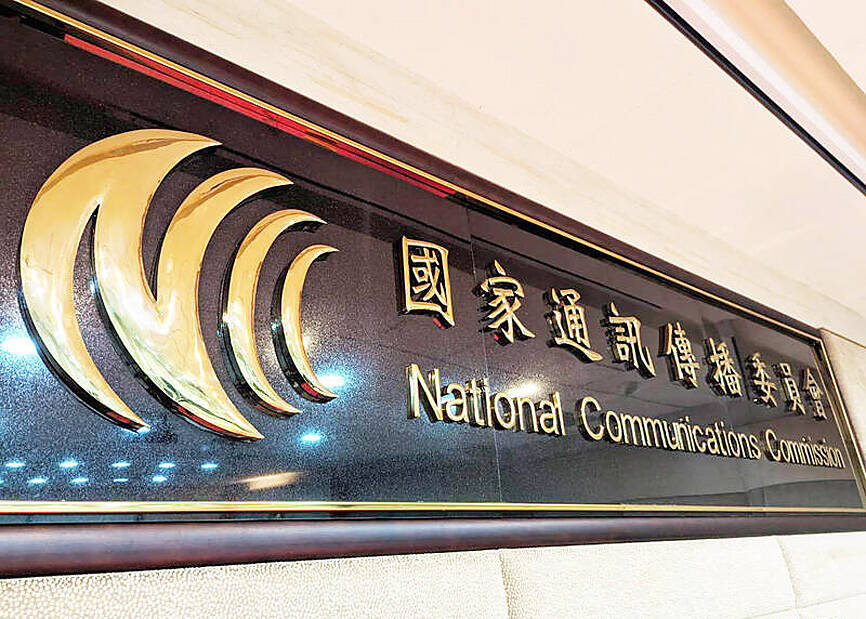The National Communications Commission (NCC) yesterday asked Taiwan Mobile’s management to explain next week why it has been offering services using the excess bandwidth in frequency bands below 1 Gigahertz (GHz) past Sunday’s deadline, after the commission had twice denied the company’s request for an extension.
The nation’s three large telecoms are permitted to have no more than 50 megahertz (MHz) in frequency bands below 1GHz, which can produce radio waves that have higher penetration and diffraction capabilities and enable telecoms to broaden the service coverage of 5G systems.
Taiwan Mobile obtained 60MHz in highly sought-after frequency bands due to its merger with Taiwan Star Telecom, which the commission approved last year on the condition that by Sunday Taiwan Mobile return the excess bandwidth of 10MHz to the government, or sell or transfer it to other telecoms.

Photo: Tsai Ssu-pei, Taipei Times
Taiwan Mobile challenged the NCC ruling at the High Court last year, saying that the excess bandwidth should not be returned to the government free of charge.
It also twice requested an extension to use the excess bandwidth, both of which were denied by the NCC.
The Ministry of Digital Affairs, which plans and regulates the use of frequency bands, yesterday told reporters that it has yet to receive Taiwan Mobile’s application to return the excess bandwidth, adding that it would work with the NCC to ensure that the telecom complies.
NCC officials said that they have ascertained that Taiwan Mobile has been using the excess bandwidth to provide services through three methods: using radio wave monitoring stations, dispatching personnel to conduct tests around base stations and administering inspections of the telecom’s network management center.
The telecom could be fined NT$500,000 to NT$5 million (US$15,322 to US$153,224) if it is determined to have contravened the Telecommunications Management Act (電信管理法) by failing to strictly adhere to the network construction plan it submitted to the NCC, commission officials said.
“The telecom would be given one more chance to make a statement before the commission makes a final ruling on the case,” the regulator said.
In other news, the NCC commissioners reached a unanimous decision to streamline evaluations of television channels, but the new rule does not apply to shopping networks, local channels or channels that produce news, financial news, stock market reports, children’s programs or X-rated content.
It would also not apply to channels that have records of breaching broadcast media regulations in the first three years of the licensing period.

Taiwan is to commence mass production of the Tien Kung (天弓, “Sky Bow”) III, IV and V missiles by the second quarter of this year if the legislature approves the government’s NT$1.25 trillion (US$39.78 billion) special defense budget, an official said yesterday. Commenting on condition of anonymity, a defense official with knowledge of the matter said that the advanced systems are expected to provide crucial capabilities against ballistic and cruise missiles for the proposed “T-Dome,” an advanced, multi-layered air defense network. The Tien Kung III is an air defense missile with a maximum interception altitude of 35km. The Tien Kung IV and V

The disruption of 941 flights in and out of Taiwan due to China’s large-scale military exercises was no accident, but rather the result of a “quasi-blockade” used to simulate creating the air and sea routes needed for an amphibious landing, a military expert said. The disruptions occurred on Tuesday and lasted about 10 hours as China conducted live-fire drills in the Taiwan Strait. The Civil Aviation Administration (CAA) said the exercises affected 857 international flights and 84 domestic flights, affecting more than 100,000 travelers. Su Tzu-yun (蘇紫雲), a research fellow at the government-sponsored Institute for National Defense and Security Research, said the air

Taiwan lacks effective and cost-efficient armaments to intercept rockets, making the planned “T-Dome” interception system necessary, two experts said on Tuesday. The concerns were raised after China’s military fired two waves of rockets during live-fire drills around Taiwan on Tuesday, part of two-day exercises code-named “Justice Mission 2025.” The first wave involved 17 rockets launched at 9am from Pingtan in China’s Fujian Province, according to Lieutenant General Hsieh Jih-sheng (謝日升) of the Office of the Deputy Chief of the General Staff for Intelligence at the Ministry of National Defense. Those rockets landed 70 nautical miles (129.6km) northeast of Keelung without flying over Taiwan,

A strong continental cold air mass is to bring pollutants to Taiwan from tomorrow, the Ministry of Environment said today, as it issued an “orange” air quality alert for most of the country. All of Taiwan except for Hualien and Taitung counties is to be under an “orange” air quality alert tomorrow, indicating air quality that is unhealthy for sensitive groups. In China, areas from Shandong to Shanghai have been enveloped in haze since Saturday, the ministry said in a news release. Yesterday, hourly concentrations of PM2.5 in these areas ranged from 65 to 160 micrograms per cubic meter (mg/m³), and pollutants were